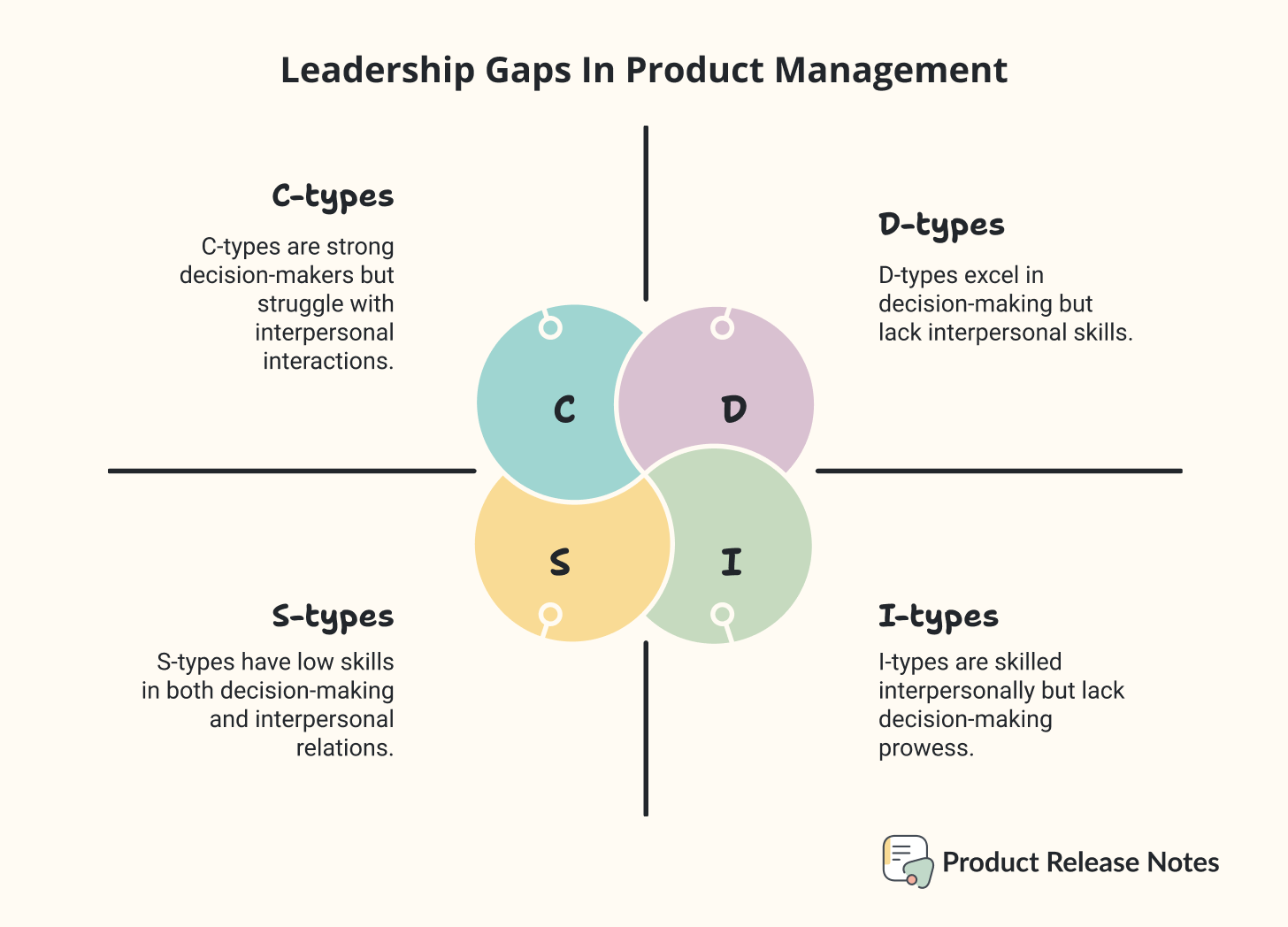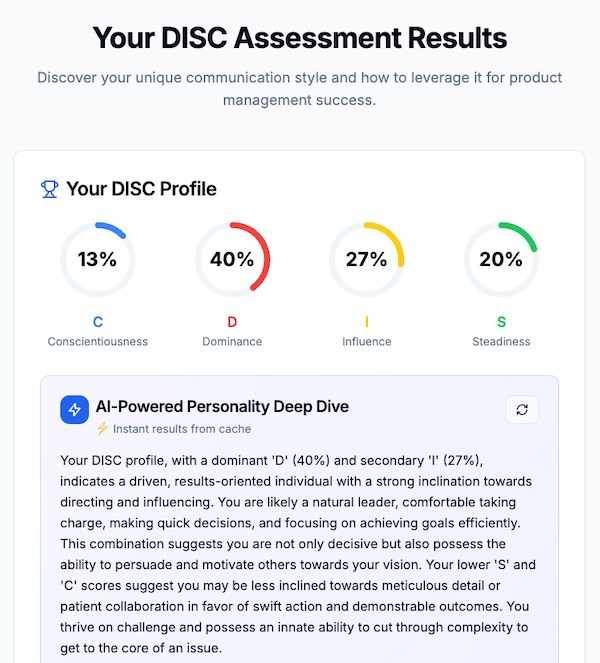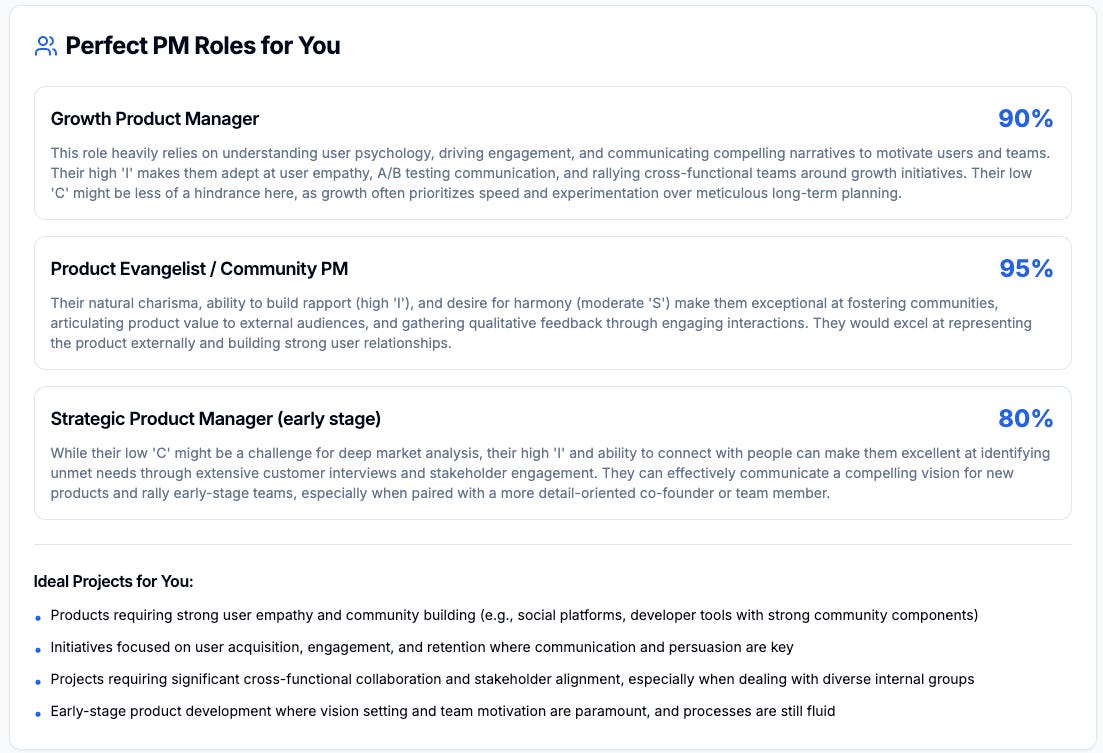Why Product Leaders Suck at Difficult Conversations (And How AI Fixes It)
I built an AI-powered DISC assessment to reveal the leadership gaps that cause 49% of workplace conflict for you.
There’s a pattern I’ve noticed after working with product managers across different companies. They walk into stakeholder meetings, freeze under pressure, or alienate teams without realizing why. And the worst part? They’ve never actually assessed their own communication style.
The reality is different. They’ve never actually assessed their own communication style.
Research shows that 49% of workplace conflict happens as a result of personality clashes and egos, not strategy misalignment. Not bad processes. Personality clashes.
Think about your last difficult conversation with a stakeholder. Did you know what communication style they preferred? Did you know your own default response pattern under stress?
Most product managers would answer no to both.
That’s the gap I built an AI tool to fix. But before I tell you about that, let me show you why this problem is costing you more than you realize.
What You’ll Learn
Why traditional DISC assessments fail product managers
How AI changes personality assessment completely
The four DISC types and their hidden leadership gaps
Real examples of how each type handles difficult conversations differently
How I built an AI-powered DISC tool specifically for PMs (and what I learned)
A 10-minute assessment to identify your communication blind spots
The Hidden Crisis in Product Management
Let me start with a truth that nobody wants to admit. Over 80% of product managers either have experienced or are currently experiencing burnout. And here’s the bigger issue: managers are 36% more likely to experience burnout and 24% more inclined to consider leaving their positions within the next six months compared to non-managers.
Why? Conflict.
Managers spend at least 25% of their time on workplace conflict. For product managers, this number is probably higher. You’re caught between engineering teams who want technical perfection, marketing teams who want aggressive timelines, and executives who want revenue growth.
But here’s what’s fascinating: that 49% of conflict from personality clashes? It means half your difficult conversations aren’t actually about the work. They’re about how different people process information and make decisions.
The University of California found that workplace conflicts cost companies an estimated 359 billion dollars annually. That’s real money lost to communication breakdowns that could have been prevented with basic personality awareness.
Think about it. You probably know your stakeholder’s title, their KPIs, maybe even their favorite coffee order. But do you know whether they’re a detail-oriented analyzer who needs data before deciding, or a big-picture thinker who just wants you to tell them the answer?
If you know, you’re on the right track! Yet most product leaders have no idea.
Why Traditional DISC Assessments Don’t Work for PMs
DISC has been around since William Moulton Marston developed it in 1928. It identifies four personality types: Dominance, Influence, Steadiness, and Conscientiousness. Research shows that teams that used DISC assessments had a 34% increase in overall productivity compared to those that did not.
So DISC works. The problem is how it’s delivered.
You spend 20 minutes on a generic test. Get a report that says “you’re a D type” or “you’re an S type.” And then what? You have no idea what that means for handling your difficult VP of Sales who contradicts you in every meeting. You have no context for why you and your lead engineer can’t seem to communicate effectively.
Traditional DISC gives you a label without a playbook.
Here’s the other problem: 60% of decision-making in leadership assessments is affected by cognitive biases. When you rate yourself as “direct” or “enthusiastic,” you’re deciding based on your idealized self, not your actual behavior under stress.
This is where AI changes everything.
How AI Transforms Personality Assessment
AI can detect personality traits with up to 82% accuracy by analyzing behavioral data and language patterns. But more importantly, AI can do something traditional assessments never could: personalize the any framework to your specific role and challenges.
Instead of generic advice about D-types, an AI assessment can tell you: “As a product manager with a D-type personality, your strength is decisiveness, but here’s why your team interprets your quick decisions as dismissive.”
A recent study from Deloitte, shows that companies that incorporate AI in their leadership assessment processes are 33% more likely to outperform their competition. And when AI is used in evaluation processes, it can reduce bias by up to 42%.
AI gives you context. AI gives you solutions. AI connects your personality type to the actual problems you’re facing in your job.
This is exactly what frustrated me enough to build something myself.
The Four DISC Types and Their Hidden Leadership Gaps
Let me walk you through the four DISC types and show you how each one struggles with difficult conversations in product management.
The D Type (Dominance): The Results-Obsessed Problem Solver
D-types are direct, decisive, and focus on results. They’re natural problem solvers who make quick decisions and aren’t afraid to take risks. In product management, D-types are your champions. They push roadmaps forward. They make the hard prioritization calls.
But here’s where D-types trip up. They’re impatient. They don’t listen well. And when a stakeholder raises a concern, they see it as an obstacle rather than valuable input.
How D-types handle saying no:
A stakeholder requests a feature that doesn’t align with the roadmap.
❌ What D-types actually say: “That’s not a priority right now. We’re focused on X.”
✅ What they should say: “I hear what you’re asking for. Let me show you our current priorities and why they matter. Where does this fit in terms of business impact?”
The difference? The first response shuts down conversation. The second invites dialogue while maintaining boundaries.
The I Type (Influence): The Idea Machine
I-types are outgoing, enthusiastic, and persuasive. They excel at brainstorming and generating excitement around new ideas. In product management, I-types are your storytellers. They sell your vision. They inspire teams.
The I-type trap? They love ideas more than execution. They get excited about five new directions in a single week. Teams around them feel energized but confused.
How I-types handle saying no:
An executive wants to pivot strategy based on a competitor’s move.
❌ What I-types actually say: “That’s an interesting idea! Let me think about how we could do that...”
✅ What they should say: “I love the creative thinking. Before we pivot, let’s look at what data tells us about our current approach. Can we test this hypothesis first?”
I-types avoid conflict by agreeing too quickly. They need to learn that saying “let’s validate this first” isn’t rejection, it’s responsible leadership.
The S Type (Steadiness): The Reliable Team Player
S-types are patient, reliable, and supportive. They’re excellent listeners and skilled at building relationships. In product management, S-types create psychological safety. Teams trust them. Collaboration flows naturally.
But S-types have a hidden weakness. They avoid conflict at almost any cost. They struggle to push back on bad ideas. They say yes when they should say no.
How S-types handle saying no:
A stakeholder keeps pushing for a feature that clearly won’t work.
❌ What S-types actually say: “Okay, let me see what I can do...”
✅ What they should say: “I appreciate you bringing this to me. I want to be honest about what’s realistic. Here’s what concerns me about this approach, and here’s an alternative that might work better.”
S-types often get walked over because they’re so focused on maintaining harmony that they never establish clear boundaries.
The C Type (Conscientiousness): The Detail-Oriented Analyst
C-types are analytical, detail-oriented, and systematic. They excel at planning and organizing. In product management, C-types are your quality guardians. They catch edge cases. They anticipate problems.
The C-type challenge? They can get paralyzed by perfectionism. They want all the data before making a decision. They’re critical of ideas that haven’t been fully thought through.
How C-types handle saying no:
A team wants to ship a feature quickly without full testing.
❌ What C-types actually say: “We can’t ship this. There are 15 edge cases we haven’t covered.”
✅ What they should say: “I see the urgency. Here are the three critical risks we must address before shipping. The other issues can be monitored and fixed post-launch if needed.”
C-types retreat into data when they’re uncomfortable. They need to learn that “good enough with clear risks” is often better than “perfect but late.”
I Built an AI-Powered DISC Assessment for Product Managers
After seeing this gap over and over, I decided to build something different. Not another generic DISC test, but an AI-powered assessment specifically designed for the challenges product managers face.
I used Lovable.dev, an AI prototyping tool, to build the entire platform. Why Lovable? Because it lets lazy people like me turn ideas into working apps in minutes. The same way I prototyped a other things here, I built this DISC assessment by describing what I needed in plain English.
Here’s what makes it different:
Built for PM Scenarios: The questions aren’t about generic workplace situations. They’re rooted in product management challenges you actually face - handling roadmap conflicts, responding when executives change priorities, communicating with your team under pressure.
AI-Powered Insights: Instead of generic recommendations, you get context-specific guidance. The assessment understands your DISC type and connects it to the specific challenges product managers face.
Actionable Immediately: You get more than a report. You get a concrete playbook for handling difficult conversations with each DISC type. You get strategies for adapting your communication style.
Built for 2025 and Beyond: The platform uses AI to personalize your assessment in ways traditional DISC tests never could. It learns from your answers. It provides real-time feedback.
The most surprising thing I discovered building this? I thought I’d be a strong D-type. Turns out, I’m pretty balanced between D and I. That explained so much about why I sometimes struggle between wanting to decide quickly and wanting to bring everyone along.
That’s the power of actually assessing yourself, not assuming.
Real Examples: How Each Type Tackles the Same Situation
Let me show you a real scenario and how each DISC type would handle it differently.
Scenario: Your VP of Sales wants you to build a custom reporting feature for one enterprise client. It would take three weeks of engineering time but only serves this one account.
🦬 D-Type Response: “We’re not doing that. One client doesn’t drive our roadmap. We build for our core market.”
What happens: VP feels dismissed. Goes over your head to your CEO.
💡 I-Type Response: “I love that you’re thinking about ways to close this deal! Let me brainstorm some options with the team and get back to you.”
What happens: VP thinks you agreed. Three days later asks for a timeline. You haven’t actually decided.
🧘♀️ S-Type Response: “I understand this is important for the deal. Let me talk to engineering and see what we can do.”
What happens: Engineering team is frustrated because they know this is a bad idea, but you committed anyway.
📊 C-Type Response: “I’d need to see the full requirements, understand the technical complexity, review our current sprint commitments, and analyze whether this creates technical debt.”
What happens: VP thinks you’re stalling. Decision gets escalated because you took too long.
Better Response (Adapted): “I want to help you close this deal. Here’s my concern: we have 847 customers, and this feature only serves one. Our strategy is to build capabilities that impact at least 30% of our user base. Can we dig into what problem this client is actually trying to solve? There might be a solution that helps them and benefits our broader customer base.”
This response works regardless of your DISC type because it:
Acknowledges their goal
Explains your reasoning with data
Offers an alternative path
Keeps the relationship intact
Take the Assessment (10 Minutes to Transform Your Leadership)
I created this tool because I was tired of seeing my colleagues blame themselves for conflicts that were actually just a result of personality mismatches. I was having trouble with my cross-functional collaboration skills, too.
The assessment takes about 10 minutes. You get:
✅ Your primary and secondary DISC types
✅ Your leadership strengths and blind spots
✅ Specific scenarios showing how your type handles conflict
✅ A personalized communication playbook
✅ Strategies for working with each DISC type
Here’s what makes the AI-powered version different: it doesn’t just tell you “you’re a D-type.” It shows you: “When you’re under stress, you become more commanding and less collaborative. Here’s why this happens, and here’s exactly what to do when you feel that impulse.”
Understanding your communication style will reduce the time spent dealing with conflict and increase the energy available for creating great products.
Ready to discover your leadership gaps?
Take the assessment here:
Note: Anyone on FREE plan can do the test, but the special AI insights is currently available for paid subscribers as I continue to refine the AI algorithms and add more PM-specific scenarios. You can also unlock them for a one-time fee of $29.
Of course, this will continue to evolve for paid users based on your feedback!
The Statistics Everyone Ignores About Difficult Conversations
Here’s what fascinates me. 95% of people say conflict management training improved their ability to resolve disputes.
95%. That’s almost everyone.
But most managers never take the training. Why? Because it feels generic. Because they haven’t identified their specific gap.
This is where DISC plus AI becomes invaluable, not sitting through generic conflict management training.
Teams with diverse personality types are 35% more effective in problem solving. But only if those personality types actually understand each other. If you don’t know what type your engineer is and why they think differently than you, that diversity becomes friction.
Final Thoughts
You don’t have to be naturally charismatic to be a great leader. You don’t have to transform your entire personality. You just need to understand yourself and adapt thoughtfully to the people around you.
Believe it or not, many leaders never do this work! They blame difficult relationships on the other person. They assume they’re bad at conflict. They burn out trying to be something they’re not.
But when you understand your DISC type, everything becomes clear. Suddenly, the conflict with your engineer makes sense. Your communication struggles with your VP of Sales have a pattern. Your team dynamics start to improve not because you changed, but because you became more intentional.
The difference between a good product manager and a great one isn’t technical skills. It’s the ability to navigate difficult conversations without burning bridges.
What’s your biggest challenge with stakeholder communication? Drop your thoughts in the comments, and let’s figure this out together. 👇








